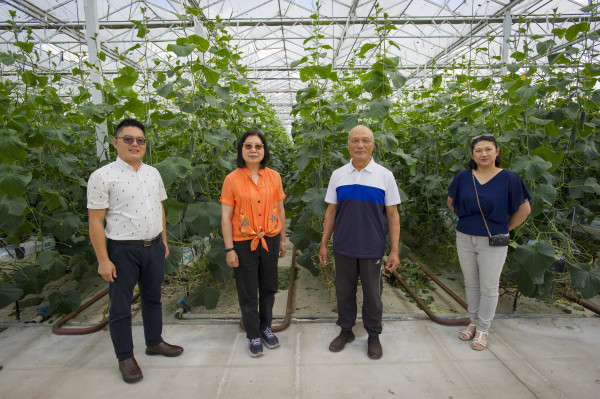Small and adaptable: Small grower keeps going with help from industry characters
27 March 2023
Edward (Yujen) Lee and his wife Michelle (Yuting) run Lee Wang Hothouse Ltd in Pukekohe, and can put new meaning into 'learning from the ground up'.

Michelle and Edward Lee of Lee Wang Hothouse, with his parents who joined them from Taiwan to help grow the business
Edward arrived in New Zealand from Taiwan as a student in 1996. There, he worked in the grocery trade and in service work. His parents, Pao-Chu Lee Wang (mum) and dad, Wen Chao, came from six to seven generations of outdoor vegetable growers.
"My parents and wife encouraged me to step out, my English was not good, it was another world. Our business started in 2009 right after the Global Financial Crisis. I became a resident. My parents decided to come, bring their skills and grow roots in New Zealand society. We purchased a two-hectare property with two older-style plastic tunnel houses. The previous owner had grown tomatoes.
"We continued growing loose-run tomatoes and learned from our mistakes. We even had to learn where to deliver the tomatoes. My parents' experience was very important as I had never worked with tomatoes. But their experience was growing outdoors. Indoors is very different."
Edward joined Tomatoes NZ and luckily came across some of its ‘characters’ including Anthony Tringham from The Curious Croppers. He also met NZ Hothouse Ltd managing director Simon Watson – by coincidence in a coffee shop – who helped Edward and Michelle develop planting and marketing programmes.
Nowadays the production from Lee Wang Hothouse goes out through NZ Hothouse and Progressive Enterprises supermarkets.
"We grew tomatoes for 14 years. It was always a struggle to make a profit. The critical moment came when prices for tomatoes plunged from $135 per crate to $10–$15 per crate.
"It almost gave me a heart attack, but crisis drives opportunity. The cost of labour was too high. We had to learn to grow for the market."
This prompted a decision to invest in a new 1700 sqm glasshouse and a move to growing cucumbers as the primary crop. Annual production of cucumbers is now more than 18,000 crates.
While returns from Lee Wang Hothouse have increased slightly, overheads have increased massively, and they face the same struggles as many growers both indoor and outdoor – the labour shortage, the cost of gas for heating which has soared from $7 to $12 per gigajoule. Rockwool growing substrate has almost tripled in price. World events have resulted in huge increases in shipping costs and pushed the cost of fertiliser up from $50 to $100 a bag.
Lee Wang Hothouse has employed good management, good marketing and new technology in an attempt to reduce operating costs and increase production, Edward says.
It would help if the government could see from the point of view of small growers, and focus on industry, he adds.
"If big growers are forced to import, that hits the smaller growers. I really want to do something in New Zealand, we don't want to leave. We want to provide hope for the younger generation."
Peak production runs from September to the end of April, and Lee Wang Hothouse employs three full-time staff who work alongside Edward, Michelle and his parents.
Stefan Vogrinicic of Grower2Grower helps Lee Wang Hothouse as a technical advisor. He is a co-opted member on the Tomatoes NZ board, a former tomato grower, and has worked with Edward for more than ten years.
"Edward layers his crops similar to a long crop of tomatoes. This makes it much easier to grow and control the crop rather than the traditional 'umbrella' system. A further advantage is that harvesting is done from the ground up, which reduces picking time. He also treats his staff well and gets quality work, which is to his advantage.
"I think Edward, as a small business owner, has shown great adaptability and demonstrated a bold approach by converting old greenhouses and building a new greenhouse," Stefan says.
First published in the March 2023 issue of NZGrower magazine. Author: Geoff Lewis.
